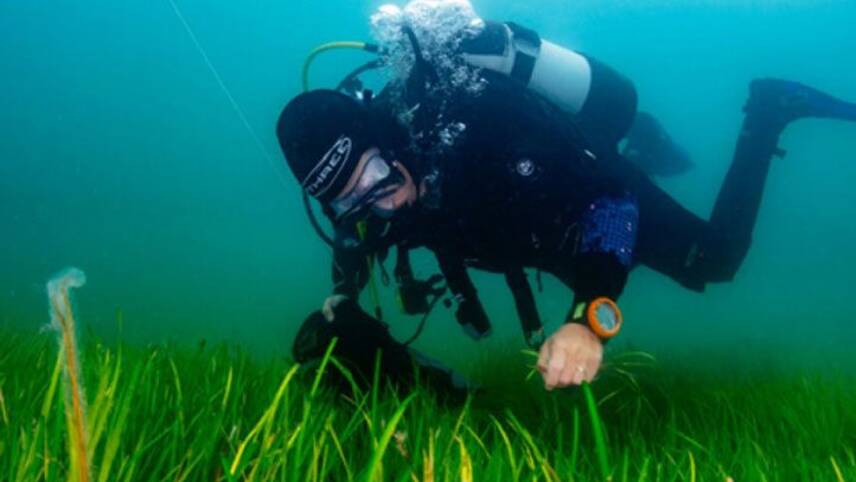Register for free and continue reading
Join our growing army of changemakers and get unlimited access to our premium content

Pictured: A diver working with seagrass in Dale Bay
That is according to new research commissioned by think tank Green Alliance and conducted by WPI Economics, published today (4 May).
According to the new report detailing the findings, entitled ‘jobs for a green recovery: levelling up through nature’, some 11,000 of the 16,000 roles could be created in the constituencies with the greatest labour market challenges.
These include coastal communities that have been affected, historically, by the closure of shipyards and, most recently, due to dwindling tourism and hospitality amid Covid-19. Such communities, the report states, are primed for seagrass planting.
More than 90% of the UK’s seagrass is believed to have been lost in the past century. Yet the plant is fast-growing and provides a rich habitat, acting as a potential solution to the net-zero transition and the need to respond to the biodiversity crisis.
Wetland creation and restoration is another job creation opportunity for coastal communities; Anglesey and Newport in Wales are cited in the report as prime locations.
There are also opportunities for tree planting in both urban and rural locations, the report states, including in regions currently affected by the fourth industrial revolution, such as County Durham, Copeland, Wolverhampton and Ashfield.
WPI Economics arrived at its forecast by matching employment data at a constituency level with maps identifying the potential for nature restoration. It claims that the jobs identified are a mix of entry-level roles – ideal for the newly unemployed or those on long-term furlough – and graduate-level roles – ideal for those entering the labour market for the first time, with skills in fields such as research.
“This important research shows that by investing in projects that make a greener recovery a priority, the Government could generate green jobs for the communities that need them most,” The National Trust’s outdoors and natural resources director Patrick Begg said. “This would accelerate the journey we are on to a more prosperous future for people and the planet.”
Call to action
Green Alliance is warning that the forecast detailed in the report – and an accompanying interactive map – will only be delivered with greater Government support. The think-tank has pointed to evidence that the UK is off track to deliver on a commitment to improving nature for the next generation, including missed tree-planting targets.
Chancellor Rishi Sunak had been urged to create a ‘National Nature Service’ for those left unemployed by Covid-19, but has shelved the idea. Funding has, instead, been provided directly to nature charities and through a competitive fund called the ‘Green Recovery Fund’.
Green Alliance, like many organisations, has criticised this approach, arguing that the funding level is not high enough and that allocation mechanisms are not fit for purpose. After being hugely over-subscribed, the Green Recovery Fund had to be doubled. And Green Alliance is concerned that the Government’s levelling up fund processes, covering £4.8bn, do not adequately cover natural capital.
The think tank is urging the Treasury to specifically include environmental projects in the levelling up fund. At the same time, it wants assurances that the new National Infrastructure Bank (NIB), which is launching this week, will include natural capital in its scope.
The NIB was announced late last year and will fill the role left by the European Investment Bank (EIB) as the UK completes the Brexit process. Chancellor Sunak has insisted that its activities will be aligned with the UK’s net-zero target. This month, Chris Grigg was named as chair of the new Leeds-based entity. Grigg is best known for his work as British Land Plc’s chief executive.
edie Explains: Biodiversity and business
edie readers interested in nature conservation and restoration are encouraged to recap on our recent series of content on this vitally important topic, hosted in association with the Woodland Trust.
We are hosting a special edition of the Sustainable Business Covered Podcast, featuring exclusive interviews with the Trust, Earth Securities and Patagoina, on our Soundcloud, Apple and Spotify. You can also access that episode here.
Additionally, readers can access a free-to-download ‘edie Explains’ guide on biodiversity strategy development and implementation by clicking here.
These pieces of exclusive content are companions to a recent edie webinar on biodiversity, featuring expert speakers from Unilever, The Woodland Trust and Kering. You can catch up with that session, which originally aired in April, on-demand. Please note that this is a premium webinar, so on-demand tickets cost £10 +VAT per person.
Sarah George


I always look at this section (comments), and am surprised that there are so few.
Why, I wonder.
Richard Phillips